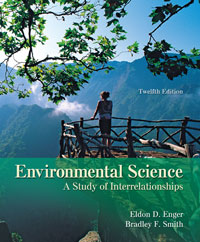ELDON D. ENGER is an emeritus professorof biology at Delta College, a community college near Saginaw, Michigan. He received his B.A. and M.S. degrees from the University of Michigan. Professor Enger has over 30 years of teaching experience, during which he has taught biology, zoology, environmental science, and several other courses. He ha sbeen very active in curriculum and course development. A major contribution to the curriculum was the development of an environmental technician curriculum and the courses that support it. He was also involved in the development of learning community courses in stream ecology, winter ecology,and plant identification. Each of these courses involved students in weekend-long experiences in the outdoors that paired environmental education with physical activity—stream ecology and canoeing, winter ecology and cross-country skiing, and plant identification with backpacking.
Professor Enger is anadvocate for variety in teaching methodology. He feels that if students are provided with varied experiences, they are more likely to learn. In addition to the standard textbook assignments, lectures, and laboratory activities, his classes included writing assignments, student presentation of lecture material, debates by students on controversial issues, field experiences, individual student projects, and discussions of local examples and relevant current events. Textbooks are very valuable for presenting content, especially if they contain accurate, informative drawings and visual examples. Lectures are best used to help students see themes and make connections, and laboratory activities provide important hands-on activities.
Professor Enger received the Bergstein Award for Teaching Excellence and the Scholarly Achievement Award from Delta College and was selected as a Fulbright Exchange Teacher twice—to Australia and Scotland. He has participated as a volunteer in several Earthwatch Research Programs. These include: studying the behavior of a bird known as the long-tailed manakin in Costa Rica, participating in a study to reintroduce endangered marsupials from islands to mainland Australia, and efforts to protect the leatherback turtle in Costa Rica. He also served as a participant in a People to People program which allowedf or an exchange of ideas between U.S. and South African environmental professionals. While traveling he has spent considerable time visiting coral reefs, ocean coasts, mangrove swamps, alpine tundra, prairies, tropical rainforests, cloud forests, deserts, temperate rainforests, coniferous forests, deciduous forests, and many other special ecosystems. This extensive experience providesthe background to look at environmental issues from a broad perspective.
Professor Enger is married, has two grown sons, and enjoys a variety of outdoor pursuits such as cross-country skiing, hiking, hunting, fishing, camping and gardening. Other interests include reading a wide variety of periodicals, beekeeping, singing in a church choir, and preserving garden produce. | BRADLEY F. SMITH is the Dean of Huxley College of Environmental Studies at Western Washington University in Bellingham, Washington. Prior to assuming the position as Dean in 1994, he served as the first Director of the Office of Environmental Education for the U.S. Environmental Protection Agency in Washington, D.C. from 1991 to 1994. Dean Smith also served as the Acting President of the National Environmental Education and Training Foundation in Washington, D.C. and as a Special Assistant to the EPA Administrator.
Before moving to Washington, D.C., Dean Smith was a professor of political science and environmental studies for fifteen years, and the executive director of an environmental education center and nature refuge for five years.
Dean Smith has considerable international experience. He was a Fulbright Exchange Teacher to England and worked as aresearch associate for Environment Canada in New Brunswick. He is a frequent speaker on environmental issues worldwide and serves on the International Scholars Program for the U.S. Information Agency. He also served as a U.S. representative on the Tri-Lateral Commission on environmental education with Canada and Mexico. In1995, he was awarded a NATO Fellowship to study the environmental problems associated with the closure of former Soviet military bases in Eastern Europe. Dean Smith is an Adjunct Professor at Far Eastern State University in Vladivostok, Russia and is a memberof the Russian Academy of Transport. He also serves as a commissioner for the International Union for the Conservation of Nature (IUCN) and is the President of the World Conservation Learning Network for the IUCN.
Nationally, Dean Smith serves as a member/advisor for many environmental organizations' boards of directors and advisory councils, including the National Environmental Education and Training Foundation. He served as the chair of the Washington State Sustainability Council and is the past President of the Council of Environmental Deans and Directors. He previously served on President Clinton's Council for Sustainable Development (Education Task Force).
Dean Smith holds B.A.and M.A. degrees in political Science/International Relations and Public Administration and a Ph.D. from the Schoolof Natural Resources and the Environment at the University of Michigan.
Dean Smith and his wife, Daria, live along the shores of Puget Sound in Bellingham, Washington, and spend part of the summer at their summer home on the shores of Lake Huron in the Upper Peninsula of Michigan. He has two grown children and is an avid outdoor enthusiast. |





